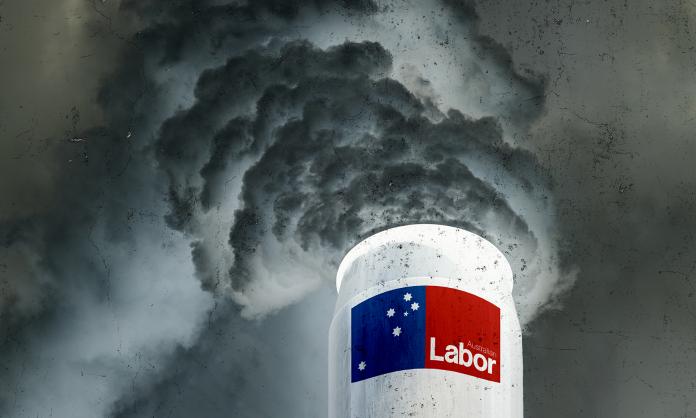The election of the Labor government in May 2022 was greeted by many in the climate movement with a sigh of relief. At last we would see the back of Scott “coal fondler” Morrison and his band of fossil fuel-loving LNP colleagues. Having seen the ALP propelled into government on a wave of public support for climate action, many expected that, despite indications to the contrary (such as Albanese’s pre-election refusal to rule out approving new coal mines), Labor might actually bring change.
It’s clear now that those who harboured such expectations were mistaken. After more than a year in government, at a time when Labor is in power in every state and territory except Tasmania, Australia’s emissions are rising, coal and gas production continues at nearly record highs, and there are 116 new fossil fuel projects in the pipeline.
During the nine years of LNP rule, the Australian government was among the world’s worst climate criminals. The Labor Party, instead of attempting a break with that appalling record, has built on it. To the extent that there’s any real difference between them, it’s that Labor is less honest about what it’s doing.
Morrison’s crimes were committed openly—even proudly—whereas Albanese and Co. prefer to obscure the public’s view with a miasma of green-tinted rhetoric. Environment Minister Tanya Plibersek’s announcement, on 27 August, that Sydney had beaten rivals around the world for the right to host the inaugural “Global Nature Positive Summit” is an example. Labor is big on hosting high-profile events like this to “discuss how we work together to protect our planet”. Doing even the most basic things actually to protect it is another thing entirely.
Labor supporters might point to the fact that it increased Australia’s emissions reduction target to a 43 percent cut by 2030 from 26-28 percent under Morrison. To describe this as doing the bare minimum would be generous, and that’s if you assume the plan is actually to reduce emissions in real terms. It’s not. Labor’s plan—centred on the so-called “safeguard mechanism”—relies, like the LNP’s before it, almost entirely on a supposed future boom in carbon capture and storage and various other shonky (if not outright fraudulent) offset schemes.
Labor has, if anything, served the interests of the fossil fuel industry better than the LNP. The Coalition’s up-front pro-fossil fuel stance provoked resistance. Back in 2019, hundreds of thousands took to the streets as part of the global School Strike for Climate movement, and direct-action-oriented groups like Extinction Rebellion mobilised thousands. During the summer bushfire crisis that year, tens of thousands took to the streets again demanding that Morrison resign.
Under Labor, in contrast, the climate movement has dwindled to almost nothing. The disruption of the COVID-19 pandemic played its part, but the most damaging thing has been the success Labor and its allies in the unions and major environmental NGOs have had in sowing the illusion that the “climate wars” are over and the country is back on something resembling the right track (the Greens and “teal” independents who voted for the safeguard mechanism bill share some responsibility for this too).
There are signs of a revival. Greens leader Adam Bandt has called on people to “come together and fight back” and “embrace the importance of protest and civil disobedience”. Momentum is building towards a planned blockade of the world’s largest coal port in Newcastle in November. There’s a long way to go, however, to build back up to where we were four years ago, and the breathing room granted to Australia’s fossil fuel industry in the intervening period will have a devastating cost.
Let’s not mince words. By continuing to throw fuel on the fire of the climate emergency, the Labor Party is condemning many people, in Australia and around the world, to death. Calling the government a “climate criminal” doesn’t really capture it. Millions are already dying from the pollution generated from burning fossil fuels, and from the increasing frequency of severe heatwaves, floods, cyclones and other extreme weather events. Millions more are seeing their livelihoods threatened, and increasing numbers are joining the ranks of climate refugees.
Was the Holocaust merely a “crime”? You might object that the Holocaust, in contrast to the climate crisis, was a conscious act conceived and directly carried out, rather than being something “one step removed” from human decision making like climate change.
This lets our political leaders off too lightly. Scientists have known for decades now what the impacts of climate change were likely to be. Politicians have chosen to ignore their warnings. They have chosen to continue to promote the continuing use of fossil fuels (in Australia’s case to the tune of $11.1 billion in government subsidies annually). It’s not credible, given all this, to present the results of these choices as if they were somehow completely unforeseen.
The harsh truth is this: Albanese, Plibersek and their Labor colleagues are well aware of the likely consequences of their actions (they even have a secret report from the Office of National Intelligence, which they’re refusing to release, detailing the impact of the climate crisis on national security). They have chosen to put the profits of the fossil fuel industry ahead of the interests of the vast majority of people and of the planet on which our society depends. They may never, unfortunately, be punished for their crimes, but history’s judgment will be severe.









